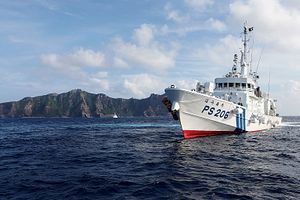While attention over the past year in the Asia-Pacific has been focused on developments in the South China Sea – in particular China’s ongoing island-building efforts and expansion of coast guard activities – a new and potentially more destabilizing “normal” has set in around the East China Sea between China and Japan. This “normal” sees China’s air and coast guard forces penetrating Japanese airspace and territorial waters near the disputed Senkaku/Diaoyu islands with increasing and sustained frequency.
By most accounts, Japan’s air force and coast guard assets have thus far succeeded in monitoring and deterring China from the types of adventurism that Japan fears might escalate to conflict. Over time, however, Japan’s ability to consistently counter the threat from China will be under increasing pressure and adjustments in Japanese military force composition and interoperability between military and civilian bureaucracies are necessary to address the challenge.
China’s Increased Maritime Activity in the East China Sea
Simmering tensions between China and Japan in the East China Sea came to a head on September 11, 2012 when the Japanese government purchased three of the disputed Senkaku islands – claimed by both China and Japan but administered by Japan – from private owners. The purchase was in part prompted by threats by right-wing Tokyo Governor Shintaro Ishihara to develop the islands, which the Japanese government worried might have upset relations with China. Soon after the purchase was announced, street protests broke out across China followed by strongly-worded Chinese government statements delegitimizing the purchase.
Beijing, however, was intent on signaling to Tokyo that actions speak louder than words. From China’s perspective, Japanese actions were a flagrant and arrogant violation of Chinese sovereignty necessitating sustained Chinese military expressions of jurisdiction and power.
































